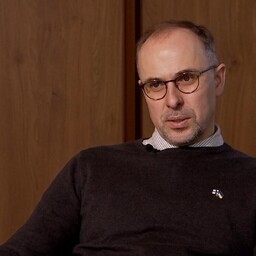Sõtšovi sõnul näitab paljude õigeusukirikute ajalugu, et muutused on tavapärased. Näiteks Lääne-Euroopa venekeelsed kogudused on olnud erinevate patriarhaatide alluvuses. 2018. aastal said nad ise otsustada, millises jurisdiktsioonis nad töötavad. Samuti Soome Õigeusu Kirik liitus 1923. aastal oikumeenilise patriarhaadiga. Selliseid näiteid on palju.
Kuremäe kloostri kohta kehtib sama. Alluvus räägib kristlikus mõttes rohkem alluvusest Kristusele. Siin segunevad sageli
usuline ja poliitiline tasand
. Seda kasutab Kuremäe klooster oma retoorikas. Alluvus ei ole kanooniline ega hierarhiline. Näiteks Vene Õigeusu Kirik oli 1917. aastani ilma Moskva patriarhita.
usuline ja poliitiline tasand
Tõlge fraasile: usuline ja poliitiline tasand
EN
religious and political level
Moskva Patriarhaadi Eesti Õigeusu Kiriku piiskop Danieli seisukoht kritiseerib Sõtšov. Daniel väidab, et tema kirik on
iseseisev Moskva patriarh
i poliitilistest avaldustest. Kuid Daniel esindab kirikut täielikult ja kasutab oma nime juures tiitlit “Moskva ja kogu Venemaa patriarh”.
iseseisev Moskva patriarh
Tõlge fraasile: iseseisev Moskva patriarh
EN
independent from the Moscow Patriarch
Sõtšov ei pea tõsiselt piiskop Danieli sõnu õigeusklike usuvabaduse piiramisest Eestis. Usuvabadusel on piirangud ning ta allub seadustele. Riigil on õigus kehtestada piiranguid. Usuvabaduse piirangud on vajalikud.
Olemas on probleeme, miks endise Moskva Patriarhaadi Õigeusu Kiriku pea Eugeni elamisluba pikendati. See tehti
turvalisuse kaalutlustel
. Me ei peaks olema
ebalojaalsed oma riigi struktuuride suhtes
.
turvalisuse kaalutlustel
Tõlge fraasile: turvalisuse kaalutlustel
EN
for security reasons
ebalojaalsed oma riigi struktuuride suhtes
Tõlge fraasile: ebalojaalsed oma riigi struktuuride suhtes
EN
disloyal to our state structures
According to Sõtšov, the history of many Orthodox churches shows that changes are commonplace. For example, Russian-speaking parishes in Western Europe have been under the jurisdiction of various patriarchates. In 2018, they were able to decide for themselves under which jurisdiction they would operate. Similarly, the Orthodox Church of Finland joined the Ecumenical Patriarchate in 1923. There are many such examples.<p>
The same applies to the Kuremäe Monastery. Submission, in a Christian sense, speaks more of submission to Christ. Here, religious and political levels often intertwine. The Kuremäe Monastery uses this in its rhetoric. Submission is neither canonical nor hierarchical. For example, the Russian Orthodox Church was without a Moscow Patriarch until 1917.<p>
Sõtšov criticizes the position of Bishop Daniel of the Estonian Orthodox Church of the Moscow Patriarchate. Daniel claims that his church is independent of the political statements of the Moscow Patriarch. However, Daniel fully represents the church and uses the title “Patriarch of Moscow and All Russia” with his name.<p>
Sõtšov does not take seriously Bishop Daniel’s words about the restriction of religious freedom for Orthodox believers in Estonia. Religious freedom has limitations and is subject to laws. The state has the right to impose restrictions. Restrictions on religious freedom are necessary.<p>
There are issues regarding why the residence permit of Eugen, the former head of the Orthodox Church of the Moscow Patriarchate, was extended. This was done for security reasons. We should not be disloyal to the structures of our state.

